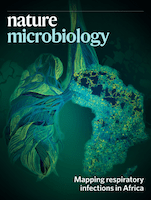
Nature Microbiology
Scope & Guideline
Unveiling the Secrets of Microbial Life
Introduction
Aims and Scopes
- Microbial Ecology and Evolution:
Research that explores microbial diversity, community dynamics, and evolutionary processes across different environments, including soil, marine, and human-associated microbiomes. - Pathogen Biology and Host Interactions:
Studies investigating the mechanisms of infection, pathogenesis, and immune responses, particularly focusing on human pathogens and their interactions with hosts. - Antimicrobial Resistance and Therapeutics:
Research addressing the emergence of antimicrobial resistance in pathogenic microorganisms and developing strategies for novel therapeutics, including phage therapy and vaccine development. - Microbiome Research and Human Health:
Exploration of the human microbiome's role in health and disease, including its impact on nutrition, immunity, and chronic conditions. - Environmental Microbiology and Climate Change:
Investigations into how microbial processes influence and are influenced by climate change, including studies on greenhouse gas emissions and biogeochemical cycling. - Synthetic Biology and Biotechnology:
Research focused on engineering microbial systems for biotechnological applications, including biofuel production, bioremediation, and metabolic engineering.
Trending and Emerging
- Microbiome and Health Interventions:
Growing interest in utilizing the human microbiome for therapeutic interventions, including probiotics, dietary modifications, and microbiome-based diagnostics, is evident in recent publications. - Viral Pathogen Research:
Increased research into viral pathogens, particularly in the context of emerging diseases and pandemics, has gained momentum, reflecting a global focus on viral genomics and vaccine development. - Environmental Microbiology and Climate Resilience:
Research exploring the role of microbes in climate resilience and their contributions to biogeochemical cycles is trending, as scientists seek solutions to mitigate climate change impacts. - Synthetic Biology Applications:
The application of synthetic biology in engineering microbial systems for biotechnological advancements and environmental applications is gaining traction, reflecting the need for innovative solutions. - One Health Approach:
The integration of microbial research across human, animal, and environmental health sectors is increasingly emphasized, highlighting the interconnectedness of microbiological studies and public health.
Declining or Waning
- Traditional Antibiotic Discovery:
Research aimed at discovering new antibiotics from natural sources has diminished, likely due to the increasing focus on alternative strategies like phage therapy and resistance mechanisms. - Plant-Microbe Interactions:
Although still relevant, studies specifically focused on plant-microbe interactions have been overshadowed by broader ecological and evolutionary perspectives, particularly in the context of climate change. - Historical Microbiology Studies:
Research emphasizing historical aspects of microbiology, such as the study of ancient microbial communities and their evolutionary significance, has seen less attention compared to contemporary applications of microbiological research. - Microbial Biogeography:
While microbial biogeography remains an important field, the focus has shifted towards functional aspects of microbial communities rather than purely descriptive studies of their distribution.
Similar Journals
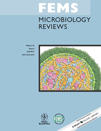
FEMS MICROBIOLOGY REVIEWS
Fostering a Deeper Understanding of Microbial DynamicsFEMS Microbiology Reviews, published by Oxford University Press, is a leading journal in the field of microbiology, with a notable impact in related disciplines such as infectious diseases and medicine. Since its inception in 1989, this esteemed journal has grown to occupy a prestigious position, consistently ranking in the first quartile (Q1) in various categories, including Infectious Diseases, Medicine (miscellaneous), and Microbiology. With an impressive Scopus ranking of #13 in Microbiology and #25 in Infectious Diseases, it is recognized for its high-quality and impactful reviews that bridge the gap between fundamental microbiological research and practical applications. Aimed at researchers, professionals, and students alike, FEMS Microbiology Reviews offers critical insights and comprehensive analyses, making it an essential resource for those engaged in the dynamic study of microbial life and its implications for health and disease.

APPLIED MICROBIOLOGY AND BIOTECHNOLOGY
Unleashing the potential of microbes for a sustainable future.Applied Microbiology and Biotechnology, an esteemed journal published by Springer, serves as a vital resource in the domains of microbiology and biotechnology. With an impressive impact factor reflecting its quality, the journal holds Q1 rankings in various categories including Applied Microbiology and Biotechnology, Biotechnology, and Medicine (Miscellaneous) as of 2023. Spanning the years from 1984 to 2024, it underscores its commitment to disseminating groundbreaking research that addresses pressing challenges in health, agriculture, and environmental sustainability. The journal is rigorously indexed and holds respectable positions in Scopus rankings, notably within the top 15% of Applied Microbiology and Biotechnology and the top 15% in Biochemistry, Genetics, and Molecular Biology. Although it is not Open Access, its comprehensive articles, reviews, and short communications are indispensable for researchers, professionals, and students eager to advance their understanding and application of microbial processes and biotechnological innovations in real-world contexts.

mSphere
Pioneering research at the intersection of microbiology and molecular biology.mSphere is a leading open-access journal published by the American Society for Microbiology, dedicated to the dynamic fields of Microbiology and Molecular Biology. Since its inception in 2016, mSphere has rapidly established itself as a reputable source of scholarly research, achieving notable impact factors and excellence within the academic community. The journal ranks in the top quartile (Q1) amongst its peers in Microbiology, and Q2 in the field of Molecular Biology, demonstrating its significance and relevance through Scopus rankings—specifically, it holds the #42 spot out of 182 in the Microbiology category and #108 out of 410 in Molecular Biology. With an editorial commitment to advancing the understanding of microbial and molecular sciences, mSphere provides an accessible platform for researchers, professionals, and students alike to disseminate groundbreaking findings. The journal promotes rigorous peer-review and invites innovative contributions aimed at enhancing microbial research mobility and molecular exploration. Accessible openly since 2016, mSphere continues to thrive as an influential publication driving scientific dialogue and discovery in the microbiological sciences.
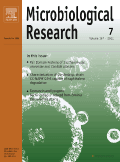
MICROBIOLOGICAL RESEARCH
Exploring the Depths of Microbial InnovationMICROBIOLOGICAL RESEARCH, published by Elsevier GmbH, serves as a leading platform for advancements in the field of Microbiology, holding an impressive Q1 ranking in its category as of 2023. With an ISSN of 0944-5013 and E-ISSN 1618-0623, this journal has been instrumental in disseminating high-quality research since its inception in 1994 and continues to contribute significantly to the academic landscape through 2024. Positioned within the top 13% of publications in the Immunology and Microbiology category, ranked #24 out of 182 according to Scopus, it attracts the attention of researchers, professionals, and students alike. While the journal is not open access, it offers vital insights and peer-reviewed articles that drive innovation and exploration within microbiological research. Its rigorous selection process underscores the importance of quality and relevance in advancing knowledge in this dynamic field.
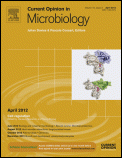
CURRENT OPINION IN MICROBIOLOGY
Delivering timely reviews for the microbiology community.CURRENT OPINION IN MICROBIOLOGY is a prestigious academic journal published by CURRENT BIOLOGY LTD, dedicated to advancing the field of microbiology through timely and insightful reviews. With an ISSN of 1369-5274 and an e-ISSN of 1879-0364, this journal has established itself as a leading source of knowledge in various subfields, consistently achieving a Q1 ranking in Infectious Diseases and Microbiology for 2023. Operating from the United Kingdom, CURRENT OPINION IN MICROBIOLOGY serves a critical role for researchers, clinicians, and students alike by disseminating groundbreaking findings and fostering discussions that shape the future of microbiological research. The journal's rigorous selection process ensures that only high-quality articles are published, reflecting its strong impact factor and high percentile rankings across relevant Scopus categories. Although it does not follow an open-access model, its comprehensive scope and valuable contributions to the medical and scientific community underscore its importance as an essential resource for advancing our understanding of microbial sciences.
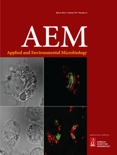
APPLIED AND ENVIRONMENTAL MICROBIOLOGY
Connecting Science and Sustainability Through Microbial InsightsApplied and Environmental Microbiology, published by the American Society for Microbiology, stands as a leading journal in the fields of applied microbiology and environmental science since its inception in 1976. With a prestigious Q1 quartile ranking across multiple categories including Applied Microbiology and Biotechnology, Ecology, and Food Science, this journal consistently disseminates high-impact research that drives innovation and advances our understanding of microbial interactions within our ecosystems and industries. As ranked by Scopus, it exhibits prominent rankings in various related fields, underscoring its critical role in shaping contemporary microbiological research. Researchers, professionals, and students alike can stay abreast of groundbreaking studies while contributing to a vast body of knowledge that spans diverse aspects of microbiology, biotechnology, and ecology, ultimately contributing to sustainable practices. Join the community of dedicated scholars and explore vital research findings that impact both environmental health and technological advancement.

Microorganisms
Fostering collaboration in the realm of microbiology.Microorganisms is a leading open-access journal published by MDPI based in Switzerland, catering specifically to the rapidly evolving fields of microbiology and virology. Since its inception in 2013, the journal aims to foster the dissemination of high-quality research through its comprehensive and interdisciplinary platform, with a particular focus on both fundamental and applied microbiological sciences. Contributing to its esteemed reputation, Microorganisms holds a commendable Q2 ranking in the categories of Microbiology and Virology, as well as in Medical Microbiology, highlighting its significance in the academic community. With a consistent impact, evidenced by its rankings in Scopus—such as rank #25 in Virology and #56 in Microbiology—the journal serves as an invaluable resource for researchers, professionals, and students looking to stay at the forefront of microbiological research. As an open-access journal, Microorganisms ensures that vital research findings are readily available to a global audience, promoting collaboration and innovation in the study of microbial life and its implications for health and disease.
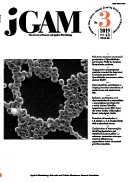
JOURNAL OF GENERAL AND APPLIED MICROBIOLOGY
Pioneering research that transforms our understanding of microbes.JOURNAL OF GENERAL AND APPLIED MICROBIOLOGY, published by the MICROBIOL RES FOUNDATION, is a vital resource in the fields of applied microbiology and biotechnology, as well as in diverse medical applications, serving an academic community dedicated to advancing microbial science. Established in 1955, this journal has a rich history of disseminating innovative research and insights into the intricate world of microorganisms. With an ISSN of 0022-1260 and an E-ISSN of 1349-8037, the journal maintains high scholarly standards and robustness, reflected in its 2023 Scopus rankings placing it in the Q3 and Q4 quartiles within its categories. While primarily based in Japan, the journal engages a global audience, offering valuable contributions that inform both theoretical perspectives and practical applications in microbiology. Despite being a non-open-access publication, it provides pivotal research findings essential for academics, professionals, and students alike, fostering a deeper understanding of microbial impact on health and the environment.
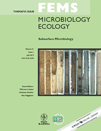
FEMS MICROBIOLOGY ECOLOGY
Transforming Ecological Understanding Through Microbial InsightsFEMS Microbiology Ecology is a prestigious journal published by Oxford University Press, specializing in the dynamic field of microbiology and its ecological implications. With an impressive impact factor and consistently ranked in the top quartiles (Q1) across multiple categories—including Applied Microbiology and Biotechnology, Ecology, and Microbiology—this journal serves as an essential resource for researchers and professionals aiming to advance their understanding of microbial interactions within ecosystems. Established in 1990 and spanning to 2024, FEMS Microbiology Ecology delivers cutting-edge research, reviews, and insightful discussions that illuminate the complex roles microorganisms play in environmental health and sustainability. Located in the United Kingdom, this journal provides a global platform for discourse, making significant contributions to both theoretical frameworks and practical applications in the biotech and environmental science sectors. Researchers and students alike will find a wealth of information that not only enriches their knowledge but also inspires innovative solutions for ecological challenges.

Frontiers in Microbiology
Shaping the Future of Microbial SciencesFrontiers in Microbiology is a leading open-access journal published by Frontiers Media SA, available since 2010, and based in Switzerland. As a prominent platform for innovative research, it specializes in microbiology and medical microbiology, marked by its impressive Q1 classification in the respective fields, reflecting its significant impact and relevance in advancing microbial sciences. With a Scopus ranking of 49th in Microbiology and 41st in Medical Microbiology, this journal is positioned among the top-tier publications, catering to a diverse audience of researchers, professionals, and students. The journal aims to disseminate groundbreaking findings and foster discussions that drive the field forward, ensuring a comprehensive coverage of microbiological studies, from basic research to applications in healthcare and beyond. Enjoy unrestricted access to cutting-edge articles that contribute to both theoretical and applied aspects of microbiology, enriching the scientific community's knowledge base.